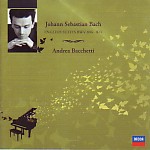The young Italian pianist Andrea Bacchetti has garnered serious attention and high praise in the European press for his prowess with new music (he recorded Berio’s complete piano works) as well as for his Bach interpretations. While Bacchetti’s English Suites may not match the lightness, transparency, and varied articulations Angela Hewitt and András Schiff bring to the table, his warm sonority, singing line, and expressive intensity proudly hold their own in such world-class company. His eloquent melodic shaping of the Bourées (Suites One and Two) and the Fourth Suite’s Menuets illustrate my point, and so does this pianist’s uncommonly introspective approach to the Sixth Suite Prelude’s introduction. Repeats offer ample opportunity for Bacchetti to make subtle adjustments in voicing or to add imaginative yet never overwrought ornaments. However, you might desire just a pinch more animation and stronger dance-like impulse in the peppier outer movements. Decca’s sonics convey formidable impact and bottom-up detail, giving the impression that the Fazioli grand’s bass notes are bowed rather than hammered. Recommended.
































